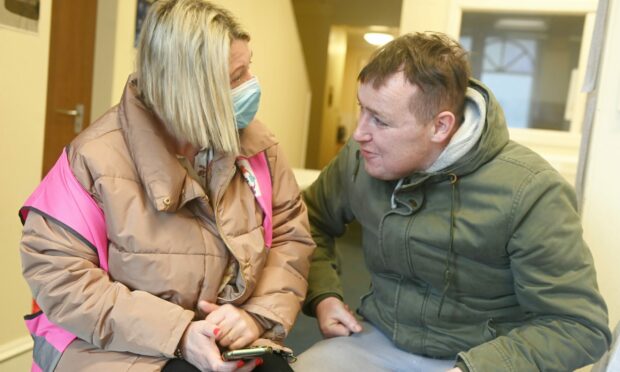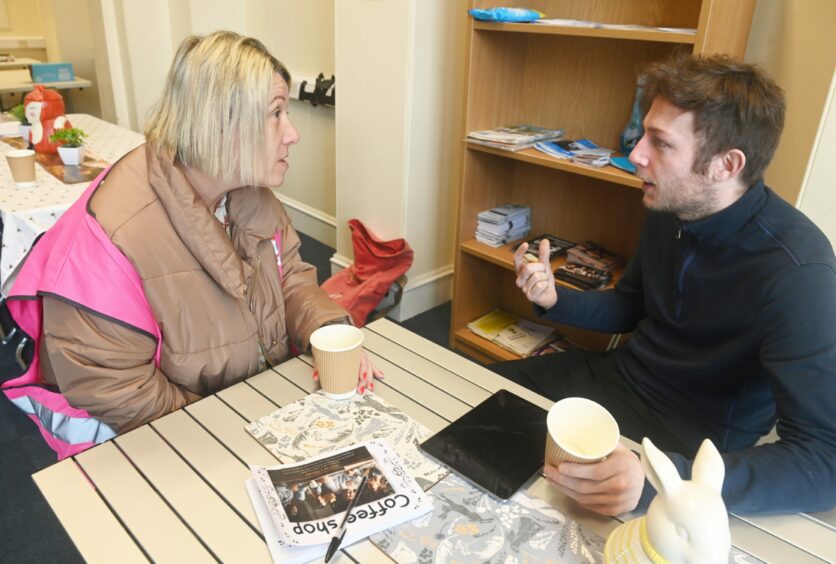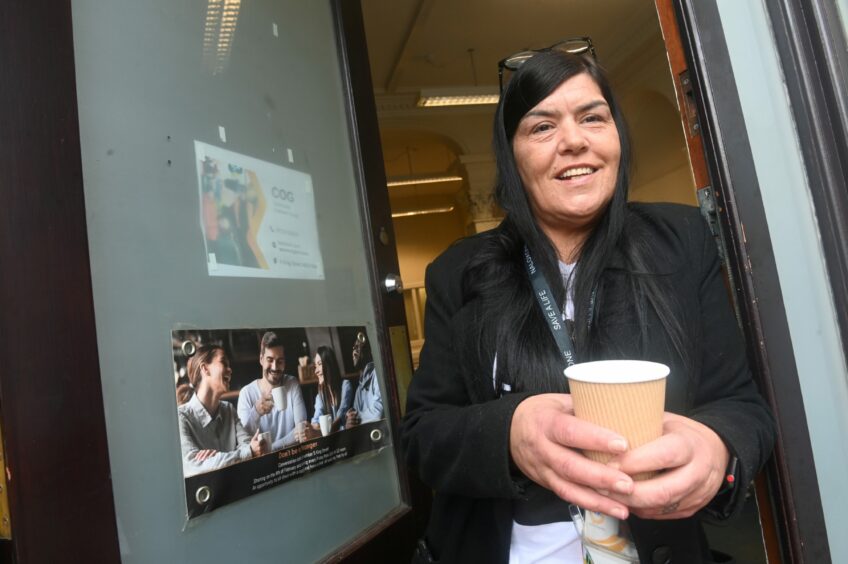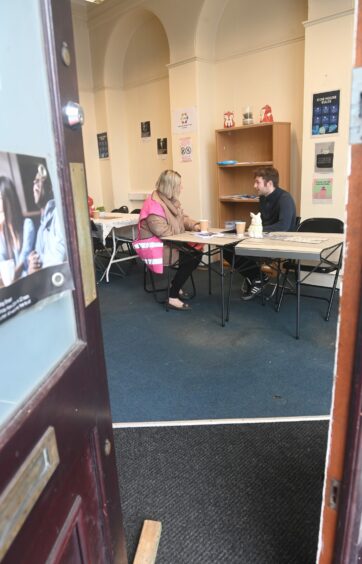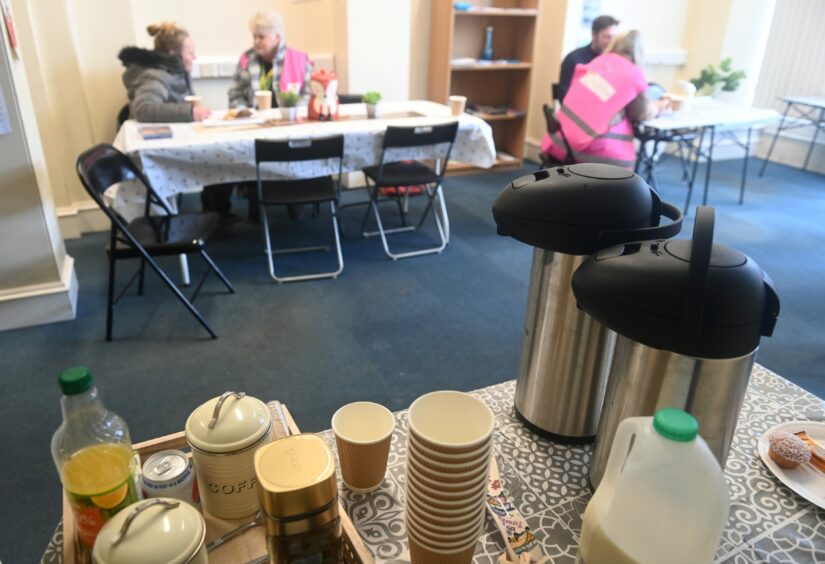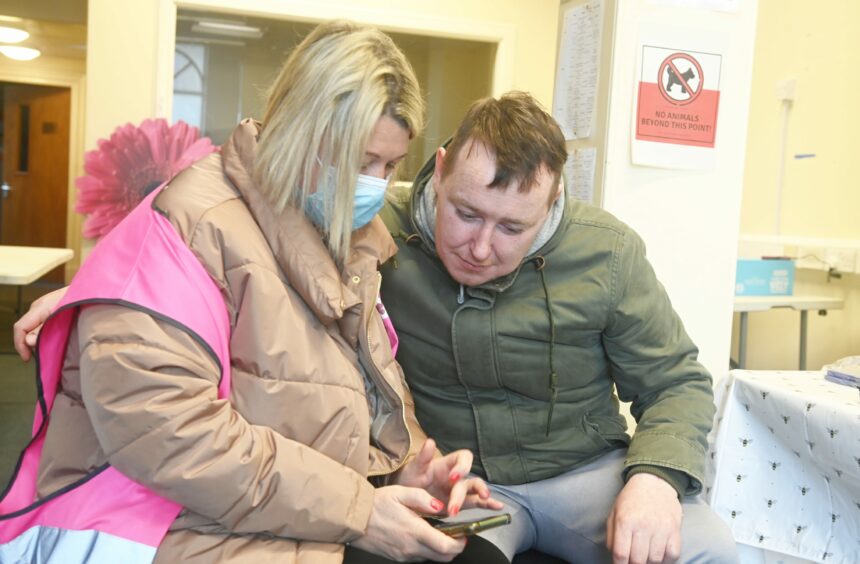In a former police office at the top of King Street, a group of volunteers set out two trays of chocolate buns and a vat of coffee, ready to welcome the first arrivals.
I’m told the building used to be the Aberdeen CID headquarters, and it retains elements of the institutional. A glass-walled office at the back looks like an interrogation room. Apparently, there are cells downstairs.
Today, however, the mood is jovial, happy; as far as you can get from the claustrophobic sterility of the UK penal system – which is perhaps just as well. A few of those expected today have had their fill of police stations.
Aberdeen’s pandemic crisis
I’m here to spend an hour or so with Aberdeen charity COG Aberdeen and the drop-in cafe that runs every Friday morning in this King Street office.
COG is an offshoot of another volunteer-run Aberdeen charity, Street Friends, which runs a network of city foodbanks.
Some in Street Friends, however, felt that the pandemic has created a new layer of vulnerable people in the city – those for whom precariousness and food poverty is a completely new, and wholly bewildering, situation.
COG now runs outreach sessions and hot food for homeless and vulnerable at city venues every Monday and Wednesday.
A cafe with a purpose
The drop-in cafe I’m attending is a new addition to COG attempt to reach people that fall through the gaps in Aberdeen’s social support network.
Called the Conversation Cafe, it is a safe space to get a hot coffee and a chocolate biscuit. More importantly, it is a place where people can find someone to talk to, whether they need help or just want to connect.
“We were seeing a lot of people coming to our outreach sessions because they were lonely so we started a place for people to come in for a chat and a cup of coffee,” says Linda Algie, COG’s chairperson.
Linda is a veteran of Aberdeen’s charity groups and a counselor for Aberdeen in Recovery, an addiction treatment programme. As Linda sees it, the pandemic has created a uniquely difficult environment that is smothering normal channels of support.
“People are kind of lost,” she says, later adding: “Covid gets blamed for a lot of things but it is the reason why we see a lot of people. People are not getting the help they need.”
A warm Aberdeen welcome
As we wait for people to arrive, Linda tells me that the ethos of the cafe is to be non-judgmental.
And in the time that I’m there, this is what stands out the most. It is Good Friday, so numbers at the cafe are as low as they have been in the two months it’s been open. But everyone that walks through the door is welcomed in, and listened to.
People like Paul, a 29-year-old from Torry who has been coming to the cafe for the past three weeks. Disarmingly frank, Paul tells me about dealing cannabis from the age of 16, the start of a criminal career that led to a six-year sentence in HMP Grampian, of which he served four.
A Covid-enforced redundancy – and an epilepsy condition that caused 10 seizures a week – pushed him into Valium and Xanax, and eventually heroin. By the end of lockdown Paul was living in virtual seclusion in his own home, shut out of work because of his epilepsy and cut off from support because of addiction. He was, he admits, losing himself.
An family intervention came at the right time, but it was the café, and the COGS outreach sessions, that proved to be a life line.
“Here in the café, it’s not like you’re scrounging,” Paul says. “They are here to listen and not judge.”
Terry’s restorative coffee
Part of that is because many of the volunteers have their own history with addiction. Linda tells me she is seven years clean from heroin and a methadone recovery.
Terry, a cheery volunteer who is manning the coffee pot with unbridled generosity, spent 17 years as a heroin addict until a near fatal fire in his flat – and an overdose – pushed him into recovery.
Between numerous offers of coffee refills, Terry tells me about his own struggles. His experience of helping others at COG Aberdeen has been a major factor in his own recovery.
Life-saving chat at Conversation Cafe
As Terry tries to tempt me with a third refill, I see another volunteer, Chris, in deep conversation with a new arrival. It’s a young man in a green jacket and a worn pair of joggers. He looks agitated, taking a mobile phone from Chris and heading up to the back of the room to make a call.
Chris says this is Andy, a regular customer. This morning, Andy slept through an appointment with the police and needs a working phone to call the station.
Andy disappears for a few minutes but when he returns he agrees to chat. He fizzes with energy, fidgeting in his seat. But he’s clear-eyed about the help from COG.
“If it wasn’t for this place I might be dead,” Andy says after Terry gets him a coffee.
“Everywhere else, they treat me like a name and a number; here they treat me like a person.”
Jill McWilliam, a volunteer who has brought her daughter along today, sits Andy down and hears his frustrations. Everything from a current lack of clothing that saw him turn up in shorts the week before to the bureaucracy of dependency and its endless form filling.
After a few minutes, Andy is still agitated but he’s now laughing. We are sitting on chairs in a tight circle. Jill puts her hand on Andy’s shoulder. Terry waits with the coffee.
“The problem is not enough people use this place,” Andy says with passion. “Actually, let me rephrase that – I don’t use this place often enough.”
Andy has helped out as a volunteer with COG before and describes the buzz it gives him. He makes plans with Jill to help out again next week.
Funding struggles
Before I leave, Linda tells me that like many charities in Aberdeen, funding for COG and the Conversation Cafe is hard to come by.
The group runs on the goodwill of its volunteers and help from local businesses. Gregg’s the baker donates soup along with McGinty’s, and support also comes from the Denmore Guesthouse, which collected Easter eggs for the group over the holiday.
The former Cognito at the Cross, The Stag and Pret a Manger are other businesses that have helped out.
“We’re struggling a little bit now,” Linda says of support from official channels. “The funds aren’t there anymore, so it’s getting a little bit harder.”
But Linda is determined to keep going. She’s seen too many people in Aberdeen succumb to addiction and desperation, all for the want of a chat over a hot cup of coffee.
At COG, Linda’s volunteers provide plenty of chat.
For the coffee, just ask Terry.
COGS runs the Conversation Cafe at 1-9 King Street every Friday from 10am.
For anyone who needs help, support or advice or knows someone who may, please contact the below mental health charities or seek guidance from your GP/doctors.
You can also call NHS24 on 111.
